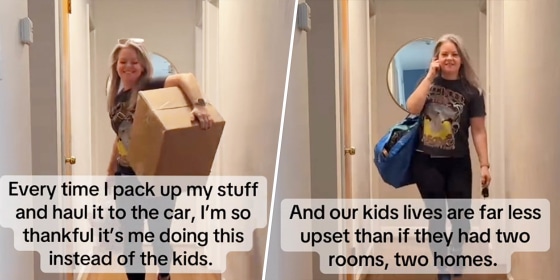Once or twice a week, Susan Fowler packs her bags, says goodbye to her five children and moves out of the family home, making way for her soon-to-be ex-husband, Josh Fowler.
The former couple, who have been married for 19 years, are getting a divorce. Instead of the traditional route (wherein one parent moves out), they’ve settled on a unique and informal custody agreement in which they take turns living in their Virginia home with their kids, three of whom were adopted during the pandemic.
“We wanted consistency for our kids,” Susan, a photographer, tells TODAY.com.
Josh, who works in advertising and videography, tells TODAY.com: “Moving the children back and forth between two homes seemed like a terrible idea ... We thought, ‘What if everything they know and love stayed the same?’”
Susan posted a TikTok video explaining their living arrangement, captioned in part: “Working through an amicable divorce means we get to think outside-the-box ... We don’t have to lose out on all the love and effort we’ve put into this family home.”
People commented on the video, with more than 5 million views, which shows Susan dragging a suitcase down a hallway.
- “This shows the level of maturity between the two parties.”
- “My husband did this with his ex for about two weeks before it blew up. So glad it works for you.”
- “This should be a law! Kids didn’t ask to be brought into this world. Why disrupt their lives because your marriage failed? Adults need to take responsibility for their actions.”
- “I wish my parents had been selfless enough to do this for me.”
- “Imagine having parents that loved you more than they hated each other.”
- “Amazing co-parenting!! Putting the kids first!!”
- “I mean, at this point, just stay together.”
- “As a kid that had to take 6-hour road trips between houses, thank you for putting their comfort first.”
According to their arrangement, Susan lives in the family home on Mondays and Tuesdays, while Josh resides there on Wednesdays and Thursdays. They alternate staying in the home from Friday to Sunday. Whoever puts the kids to bed, also wakes them up. Arrival time for each partner is 10 a.m., after the children leave for school, so any morning mishaps are handled in full by the presiding parent.
The Fowlers are modeling a practice in the wild called “birdnesting,” when particular birds species take turns flying away from the nest to secure resources, while the other cares for their young.
Susan and Josh want “birdnesting” to mitigate the transition for their children, ages, 11, 13, 16, 18 and 21.
“With five kids, keeping their schedules straight is a huge balancing act,” Susan tells TODAY.com, adding that a home base means less disruptions to school and camp schedules.
The Fowlers have also found financial perks to staying put.
One parent won’t need to rent a multi-bedroom apartment or keep duplicate versions of their children’s belongings at each home. Susan and Josh also hope that by keeping their house — which has been renovated and is nearly paid off — their children can enjoy it in the years ahead.
On their off-days, Susan lives with her best friend while Josh shares a roommate in a nearby town.
Communication and Keeping a ‘United Front’
Josh and Susan say communication is the secret sauce to their custody plan, which they put into motion a few months ago.
“We both agree that we don’t want to be married to each other ... but if we get along, we can make our kids’ lives better,” says Susan.
Josh adds, “We had to learn to communicate ... and make it work as friends. We’re going to be in each other’s lives forever, because we have kids, so why fight? There’s no need.”
While the arrangement has only been in place for several months, it works “perfectly,” according to Josh. “That doesn’t mean there aren’t challenges,” he says, “but it’s about as good as it could possibly be.”
Josh says the game plan created doubt in his friendship circle.
“Telling our friends and family was awkward because they couldn’t believe how supportive we were of each other,” says Josh. “I got warnings of, ‘Just give it a month and the whole thing will turn’ and ‘You better get a good lawyer.’ They were trying to look out for me, but it wasn’t necessary. It took a while to convince people that this is how it was going to be.”
The former couple says their children are adjusting to their new schedule.
“People say, ‘Kids are resilient,’ and my perspective is, ‘They are — but they shouldn’t have to be,’” says Susan. “Kids should not have to be resilient when it’s about something that adults can change for them.”
To keep a “united front,” Susan and Josh meet for lunch once a week at a diner.
“We have a meal and talk though everything — finances, the kids and some personal stuff,” says Josh. “We make sure we’re on the same page, because if we’re not, thats we’re breakdowns happen.”
Is ‘Birdnesting’ a Good Idea for Divorced Couples?
“This setup can work out quite nicely, especially when parents maintain a collaborative co-parenting relationship and communicate effectively,” Francyne Zeltser, clinical director of Mental Health and Testing Services at Manhattan Psychology Group, tells TODAY.com. “When executed well, it offers children consistency, routine and stability during a time of significant change.”
Zeltser points out that couples interested in birdnesting should consider its commitment.
“Financially, it can be quite demanding — maintaining the family home, in addition to two separate residences for the parents can quickly add up,” she says. “Some families try rotating between just the family home and one shared apartment, but that can introduce its own complications. After all, the goal of separation is often to create space and establish new boundaries.”
According to Zeltser, “birdnesting” is largely effective for younger kids versus older, more autonomous teens.
“From a developmental standpoint, birdnesting tends to be most beneficial for school-age children who thrive on predictability,” says Zeltser. “It allows them to keep all of their belongings in one place and maintain a steady routine without having to shuttle between two homes. For younger kids who aren’t yet able to organize and pack for themselves, this can significantly reduce stress and logistical challenges.”
For Susan and Josh, “birdnesting” won’t last forever.
“We don’t want to put a timeline on this," says Josh. “If either one of us ever decides to remarry or have a long-term relationship those new partners will have to understand. We are always up for reevaluating.”
Susan adds, “We’re going with the flow ... It’s a bridge from marriage to rebuilding our own lives.”











